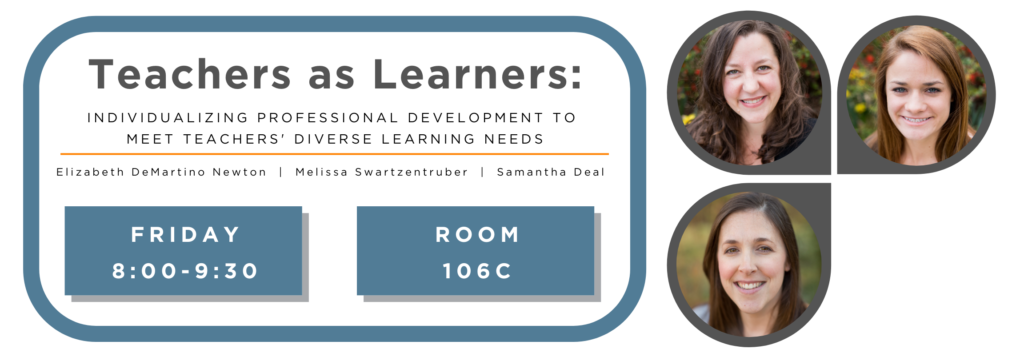
Samantha Deal, Melissa Swartzentruber, and Elizabeth DeMartino Newton
 Early childhood professionals approach our work with children with a deep appreciation for diversity; children are all unique in their learning styles, personalities, strengths, challenges, preferred modes of learning, and home contexts. Our situated knowledge about individuals in context guides us in designing curriculum experiences and classroom practices that are differentiated, are responsive to the children’s diverse needs, and support optimal learning. This diversity does not disappear when children grow up; as adults, we all approach our work and lives differently, and we each have entirely different profiles as learners. What if we use critical early childhood lenses to plan professional development opportunities that are responsive to teachers’ differing needs and styles? Approaching professional development with an appreciation for and acknowledgment of the diverse ways in which teachers learn and function best as professionals allows us to not only maximize learning by finding “good fit” professional learning experiences, but also by inviting the teachers to partner with leaders in taking responsibility for their professional growth. Respect for individuality can be applied to teaching and learning at all levels, meaningfully supporting teachers, children, and programs.
Early childhood professionals approach our work with children with a deep appreciation for diversity; children are all unique in their learning styles, personalities, strengths, challenges, preferred modes of learning, and home contexts. Our situated knowledge about individuals in context guides us in designing curriculum experiences and classroom practices that are differentiated, are responsive to the children’s diverse needs, and support optimal learning. This diversity does not disappear when children grow up; as adults, we all approach our work and lives differently, and we each have entirely different profiles as learners. What if we use critical early childhood lenses to plan professional development opportunities that are responsive to teachers’ differing needs and styles? Approaching professional development with an appreciation for and acknowledgment of the diverse ways in which teachers learn and function best as professionals allows us to not only maximize learning by finding “good fit” professional learning experiences, but also by inviting the teachers to partner with leaders in taking responsibility for their professional growth. Respect for individuality can be applied to teaching and learning at all levels, meaningfully supporting teachers, children, and programs.
Elizabeth’s Story
After teaching for many years in a university lab school program, I took a position on the leadership team, and have spent my last seven years as Assistant Director and pedagogical coach. I spend much of my time and leadership energy on coaching and mentoring teachers, and with my team of fellow leaders, I have come to view our responsive approach to professional development and mentoring as parallel to high-quality responsive teaching practices in the ECE classroom. When I view teachers as individuals, each one with a unique cultural background, set of strengths and challenges, educational and professional experiences, personality, learning style, and preferred modes of communication and processing, it is clear that it is my responsibility to design and facilitate learning experiences that align with the unique learning profile of each teacher.
 I have learned that getting it right involves so much more than valuing a responsive approach, however; responsiveness and “good fit” learning experiences are rarely accidental and require a great deal of intentionality and strategy. As such, as I navigate my coaching and supervisory roles, I keep my ECE background, critical theoretical perspectives, and guiding principles at the center… Ideas like the following are at the foundation of our approach to individualizing professional development:
I have learned that getting it right involves so much more than valuing a responsive approach, however; responsiveness and “good fit” learning experiences are rarely accidental and require a great deal of intentionality and strategy. As such, as I navigate my coaching and supervisory roles, I keep my ECE background, critical theoretical perspectives, and guiding principles at the center… Ideas like the following are at the foundation of our approach to individualizing professional development:
- Holistic Approach: The Whole Child (Teacher)
- Image of the Child (Learner) as Competent
- Social Constructivist View of Learning as Active and Process-Oriented
- Anti-Bias Approach
- Cultural Influences & Bronfenbrenner’s Ecological Model
- Scaffolding & Zone of Proximal Development
When leaders view teachers as lifelong learners who deserve rich opportunities to stretch, grow, think, experiment, create, explore passions, cultivate a professional identity, and collaborate, all within a safe and supportive context, we mediate many of the factors leading to teacher burnout and stagnant, lifeless teaching. Likewise, when leaders invite teachers into a collaborative relationship focused on professional growth – into a community of practice based on trust, vulnerability, authenticity, and integrity – we offer teachers so much more than a one-size-fits-all approach to professional development. If we know that a one-size-fits-all approach to education does not work with children, why would we think it works with teachers? Why do most teachers spend most of their professional development/inservice time sitting passively in a lecture-style learning environment? Why would we want to keep teachers at the bottom of Bloom’s taxonomy, as if they are technicians merely acquiring and memorizing a standardized recipe for success?
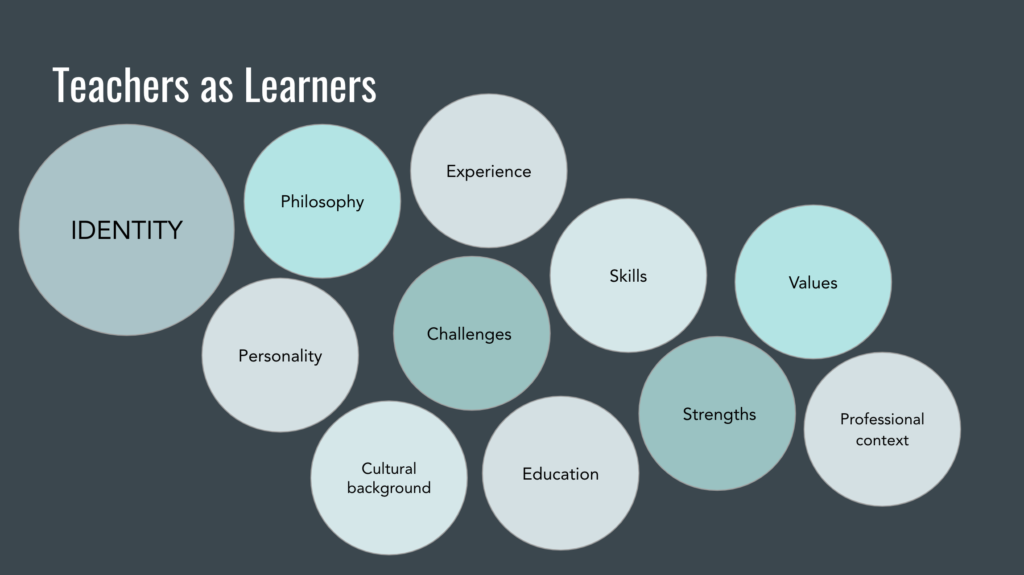
My proposal is that we honor teachers’ learning needs and rights as we honor the children’s. I propose that leaders focus on relationship to get to know teachers and their learning styles intimately and deeply. I believe that when we come to deeply know the teachers in our programs, just as we intentionally work to deeply know the children in our care, we can design individualized professional development experiences that are responsive and supportive of each teacher’s needs and preferred ways of working and learning. When we make this our goal, we see development that is deeper, richer, more rapid, and more sustainable than a transmission model offers teachers. When we invite teachers to engage in deep inquiry, and when we keep that inquiry at the center of the pedagogical conversation, teachers grow and can actively invest in their growth, coming to co-own their development in partnership with program leaders.
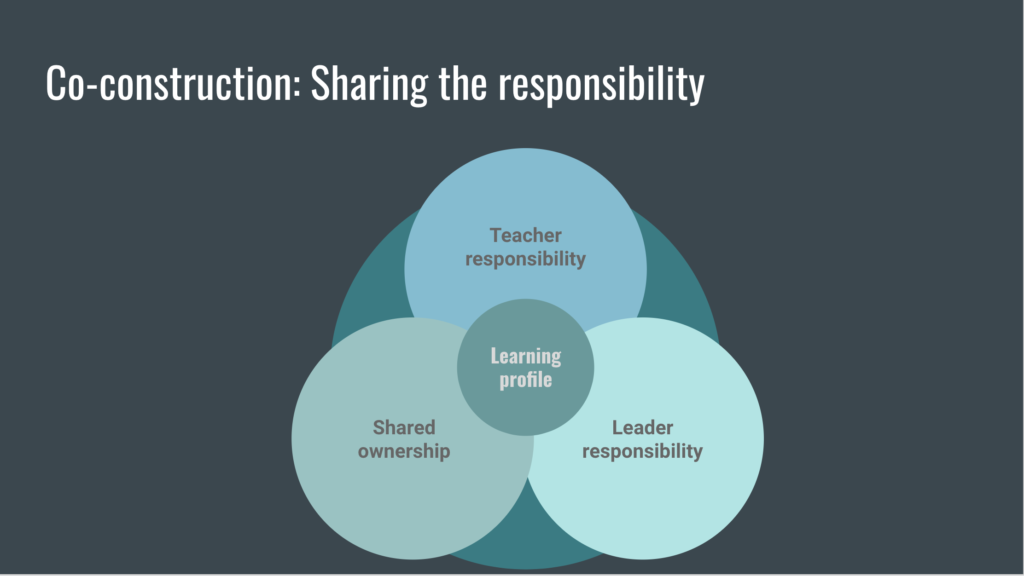
Melissa’s Story
In my ninth year of teaching, I feel as though I should have arrived at a much more thorough understanding of my particular learning style and context; however, program-supported reflective practice is a skill that was underdeveloped in me before coming to the Early Learning Center. As many teachers may find, reflective practice takes time – the most precious commodity in our work. It takes intentionality and initiative – attributes that we often prioritize when working with children, but too often are not prioritized in our own professional and personal development. It also takes vulnerability. What esteem will I forfeit with my transparency? Will I then have to defend my weaknesses to still be viewed as competent and capable? Reflection is hard. It is also worth it.
Seeing myself as a learner requires the willingness to employ these reflective practices and to continually turn the power dynamic which pervades so many teaching settings. It requires that we take a step down from our “keeper of knowledge” podium and crouch down alongside children and colleagues – working toward a different paradigm. What would our classrooms look like if we actually believed we don’t know it all?
As I mentioned, this is hard work. It becomes increasingly harder when we find ourselves lacking in support from our environments. Along my journey as an early childhood educator, I have experienced firsthand the tendency toward teacher isolation in the name of independence and competence. Based in a fear of exposure, I have built up walls to guard against transparency with colleagues and administrators. Because of my personality, this actually felt safe. Vulnerability was too risky. Once I revealed challenges in my practice, I no longer controlled the response. I could no longer govern the narrative. This risk requires boldness and trust. I have to trust the process – that if I let go of this fear of vulnerability, I will reap the benefits through my own growth and development.
Knowing the number of potential barriers I faced when approaching reflective practice and prioritizing my own learning, I deeply appreciate a setting where vulnerability is not only the norm but the expectation. Although I can’t pretend to know how to cultivate this expectation program-wide, I can attest to the constant development that accompanies such reflection and transparency.
I am drawn to the deeper meaning – the theory behind why I do what I do. My learning is catapulted when I am afforded the opportunity to dive into the depths of understanding below the surface… When I am allowed space and time to engage in conversation that digs deeper into the “why”s. If I lack an understanding of the deeper purpose behind shifts in my practice, I will lack the desire to implement change. Along with this deeper understanding comes ownership.
Story 1
The first experience I would like to share is one that was quite formative, although I didn’t know how at the time. I recall one day when I was teaching 1st grade in a charter school, I began to share with my director/principal about the new procedure I planned to implement to streamline some processes in our classroom. Years later, all I can remember from this conversation is the part when we reached a point of conflict about how the children would go about getting their materials from the countertop.
After teaching in a very different setting now, this conversation seems so utterly bizarre and even ridiculous. In the moment, however, it was enough to be a point of contention. I started to question the “Why” behind this interaction…
Why couldn’t I make this decision? Am I not qualified enough to decide these seemingly trivial aspects of classroom organization and design? Deeper still, why was my autonomy at odds with the power dynamic that existed between the leadership and teachers at that school?
Realizing that she was not willing to discuss this, I bowed out and went along with her plan. After quite a bit of reflection, I see that this small interaction lead me to decide what kind of support I desired as an educator, and what kind of management actually felt insulting. I wondered why this felt so frustrating, and I landed on several take-aways from this moment. We lacked a relationship. We lacked mutual respect and collegiality. I wasn’t convinced that she viewed me as capable and competent. Our interaction was limited to high-stakes observations and evaluations, either scheduled or surprise.
It made me think of the strategies we use with children. Are we micromanaging their every move? Are we reinforcing a power dynamic between teacher and child? Or do our actions reflect the reality that children are competent and capable – that they deserve and desire autonomy?
Story 2
The second story is more of a continuation of the first. After working in the type of environment that I just described, I nearly walked away from the teaching field altogether. Part of what I know about who I am and how I operate is a deep desire to be seen as competent and capable. I questioned whether I would feel seen that way again as a teacher.
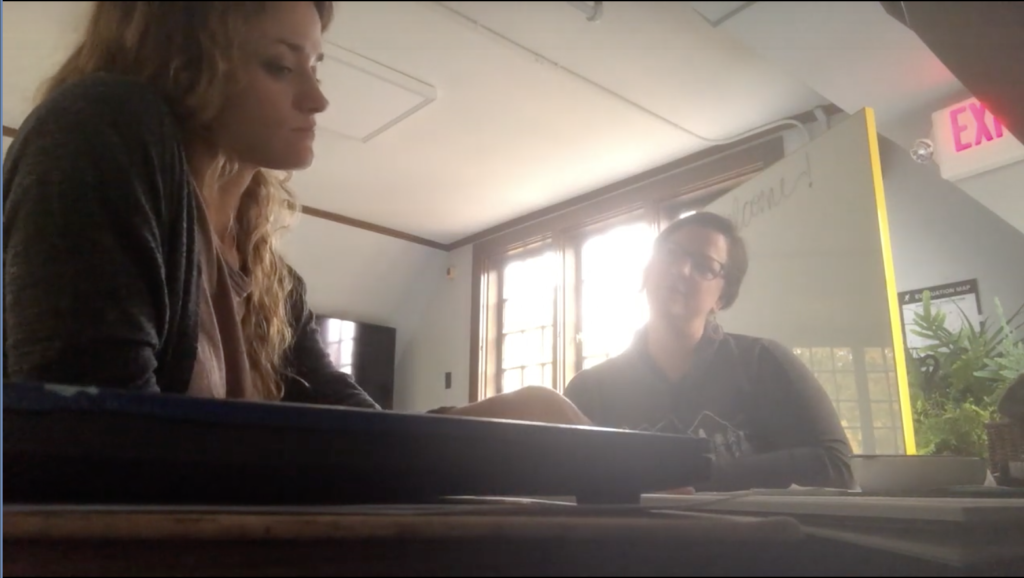 Fast forward 3 years and I am teaching kindergarten at the Early Learning Center. Coming into this context, I brought with me the years of varying degrees of comfort and discomfort in relationships with school leadership, but I felt largely like I hadn’t been afforded the opportunity to be seen as a competent practitioner who was also constantly developing.
Fast forward 3 years and I am teaching kindergarten at the Early Learning Center. Coming into this context, I brought with me the years of varying degrees of comfort and discomfort in relationships with school leadership, but I felt largely like I hadn’t been afforded the opportunity to be seen as a competent practitioner who was also constantly developing.
Through systems of support from directors and pedagogical coaches, I meet with Elizabeth on a weekly basis for an hour. In these meetings, I have found that my support needs vary from week to week. Some meetings are spent reviewing documentation and considering next steps with the children, while other times are spent navigating sensitive conversations with parents or colleagues.
I am heard, seen, and acknowledged. She doesn’t see a snapshot of my work with the children, which allows me to trust that overall, she knows who I am and what I do every day with children. From this confidence, I then feel the freedom to be transparent and vulnerable, pursuing reflective practice and growth.
The moments that I notice the shift between Story One and Two the most are when I leave our weekly meetings. I am motivated, empowered, and encouraged to do meaningful work with children and families. I’m urged to see the agency I have on the situations around me and am granted the autonomy to implement changes that align with our classroom context.
Samantha’s Story
I taught at Early Head Start for nine years before moving into the role of Demonstration Teacher at the university lab school; I have been an infant/toddler teacher and pre-service teacher mentor for the last seven years. My professional growth journey has everything to do with my own learning and work styles and the ways in which my colleagues and coaches have supported me (and sometimes lovingly pushed me) in developing new skills while honoring my way of working, communicating, processing, and being.
I am an auditory and social learner. I prefer to receive information auditorily followed with time to process information and then more time to verbally unpack what I am wondering about and coming to understand about the information I received. I learn best through small-group collaborative work, solitary work/reflection, planning and implementing ideas, workshops, professional trainings, study tours, thinking partners, videos, and readings. I don’t learn best in large groups, which is challenging since so many professional development experiences occur in large groups.
I find my personality to be positive and negative in my role as a Demonstration Teacher. A positive: My desire to be a caretaker leads me to take risks and open myself up so that others feel comfortable. A negative: I am hindered by my shyness- I do not like to be the center of attention and speaking in front of groups of people is extremely challenging for me. I have found that I can openly participate when I am working with a small group of people that I trust. For me to find the courage to verbally communicate and engage in thoughtful collaboration, I need to feel safe- safe to openly communicate my ideas without fear of shaming or negative repercussions. My fear of getting in trouble with my boss or being seen as “less-than” affect my ability to open up and fully engage within my larger learning community.
I have noticed that the more attention our leadership team places on being open, vulnerable, developing a growth mindset, fear and failure as a catalyst for change and growth during weekly meetings, in-service, and mentor meetings, the more comfortable I become. It is evolving into our work culture – part of the norm of what we do and what is expected of us. It is still incredibly hard at times, but overall easier and more comfortable because I have had so much experience and interaction focused on big concepts like vulnerability, growth mindset, and failure.
An important aspect of my style that impacts my professional learning process is that I need time to sit with ideas, reflect, and revise. Time is a precious commodity and the ability to sit with ideas and concepts isn’t always a luxury most teachers get and therefore the level of understanding isn’t as deep as it could be. This time allows me to thoroughly process and build my ideas and understanding of the work and big ideas I’m exploring. Recently, professional development emphases that are long-term and that offer us lots of time to reflect, paired with opportunities to engage in hands-on experiences (study tours, for example) have led to growth in my practice in and out of the classroom. As these experiences are geared toward smaller groups of participants, I feel comfortable being a part of the learning experience.
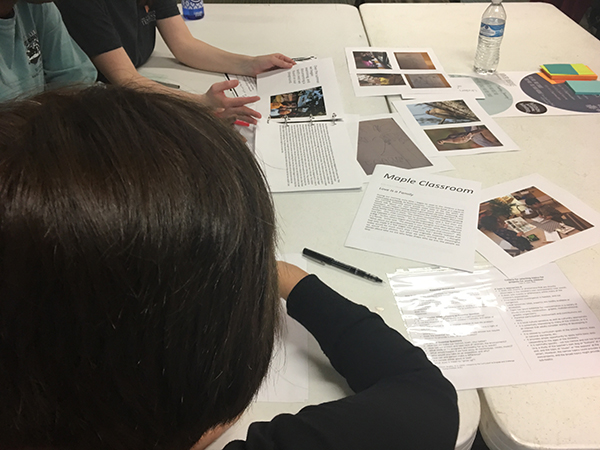
The leaders in our program and I share the responsibility for my growth, and we are partners in the process. I have had to work to be more authentically open and reflective with the college students that I work with. My job is to model reflective practices, collaboration, collegiality, risk-taking, vulnerability… all of the scary parts of teaching that require our whole self-investment are the pieces of our practice that I need to foster and support our students through as they begin to develop these particular skills in our context.
I am grateful for my work environment for many reasons, and one of those is the compassionate and steadfast support I feel from our leadership team. The expectations for change and growth are not out of reach and are adapted to fit individual learners. Knowing that I am going to be supported in a manner that fits who I am and what my individual needs are- I feel valued which then leads me to feel safe which then leads me
to be open to change and growth knowing that it is going to be hard, but the people who are gently pushing me to grow and change are supporting me in the most compassionate way possible in a work environment. All teachers deserve this kind of care and support.
Digging In
Using our early childhood lenses to examine leadership practices and individualized professional development has been a journey. Much like educators of young children, we can’t memorize an approach or set of actions for success. Rather, as leaders who support, coach, and mentor teachers, we engage deeply in the everyday work of coming to know the teachers with whom we work and then taking active steps to honor their voices, supporting them as they engage in rich learning experiences. We develop strategies for inviting input, reflection, and inquiry from teachers as we set and work toward goals, and we revise those strategies over and over again. The work is not easy and presents frequent dilemmas. The path is not always clear, and we sometimes make mistakes. At times, we make plans that we think will be meaningful and effective, yet we experience failure. The leadership learning process mirrors the teachers’ learning process, and we are all working to do our best. Within a community of practice that supports relationship, vulnerability, authenticity, and deep inquiry, we are all safe to fail and make mistakes, and we trust each other to make decisions with intentionality and integrity. Good thing none of us entered this field to do what’s easy; each of us chose this path, and we mindfully choose to dig in because to exist in an authentic place and come to work in a context where we are stimulated, challenged, encouraged, and supported feeds our souls. It also helps us meet children with that same authenticity and intentionality. Learners deserve all this in a learning environment, whether they are one or five or fifty-five. So we dig in, and we dig deeply to nurture teachers as learners in the best way we can, with our early childhood education lenses securely on, clear and focused.
Resources
Handout:
Learning Inventories:
http://www.educationplanner.org/students/self-assessments/learning-styles-quiz.shtml
https://www.verywellmind.com/kolbs-learning-styles-2795155
Professional Development at the ELC
For more information about professional development opportunities at the ELC, visit our Study Tours page and check our Early Learning Institute page for details about our yearly summer conference here in Knoxville, TN!